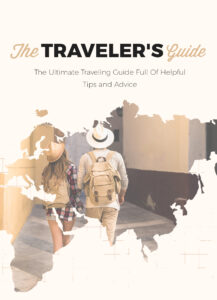Travel Safety: Protecting Yourself on the Road

Before diving in, please note: This post is for informational purposes only. If you’d like to know more about how we approach topics, feel free to check out our friendly Disclaimer Page.
Hey there, amazing readers! 🖐️ Just a quick note: yes, we know there are a lot of ads here. Trust us, we get it—it’s not the prettiest look, but they help us keep this blog alive and kicking. Those pesky little ads cover the costs of all the behind-the-scenes magic, from hosting and tech stuff to creating content we hope you’ll love.
We’re committed to delivering quality posts, and your support (even just sticking around despite the ads) means everything to us. So, bear with us, and thanks for helping us keep the good vibes rolling. Now, on to the fun stuff! 😉
TRANSLATE BUTTON AT THE END OF THE ARTICLE
Introduction: The Importance of Travel Safety
When embarking on a journey, whether for business or pleasure, ensuring your safety should be a top priority.
Traveling to unfamiliar places can expose you to various risks, from petty theft to more serious dangers.
By taking proactive measures and staying vigilant, you can protect yourself and have a worry-free trip.
This article will provide you with essential tips on how to stay safe while on the road, allowing you to enjoy your travels to the fullest.
Researching Your Destination Before You Go
One of the key steps in ensuring your safety while traveling is to research your destination thoroughly before you go.
Understanding the local customs, culture, and potential risks can help you make informed decisions and avoid dangerous situations.
Here are a few tips for researching your destination:
Familiarize yourself with the local laws and customs to avoid unintentionally breaking any rules.
Check for any travel advisories or warnings issued for your destination by your government.
Learn about the local transportation options and common scams to watch out for.
Identify safe areas to stay in and places to avoid, especially at night.
By conducting thorough research, you can minimize the chances of encountering unexpected problems during your trip.
Securing Your Belongings While Traveling
Keeping your belongings secure while traveling is crucial to prevent theft and loss.
Here are some tips to help you secure your valuables:
Use a secure, anti-theft bag or backpack to store your belongings.
Keep important documents such as your passport, ID, and travel insurance in a secure location.
Avoid carrying large amounts of cash and use a money belt or hidden pouch to store your money.
Use luggage locks to secure your bags while in transit.
Be cautious of your surroundings and keep an eye on your belongings in crowded areas.
By taking these precautions, you can protect your valuables and minimize the risk of theft during your travels.
Staying Alert in Unfamiliar Surroundings
When traveling to a new destination, it’s essential to stay alert and aware of your surroundings.
Here are some tips to help you stay vigilant while exploring unfamiliar places:
Avoid displaying expensive items such as jewelry or electronics that may attract thieves.
Trust your instincts and avoid situations or people that make you feel uncomfortable.
Stay aware of your surroundings and be cautious in crowded or touristy areas.
Keep your phone charged and accessible in case of emergencies.
Avoid walking alone at night and stick to well-lit, populated areas.
By staying alert and attentive, you can reduce the likelihood of falling victim to scams or crimes while traveling.
Using Reliable Transportation Services
When traveling in a new city or country, using reliable transportation services can help ensure your safety.
Here are some tips for choosing safe transportation options:
Use reputable taxi companies or ridesharing services recommended by locals or your accommodation.
Discover "The Traveler’s Guide: Your Ultimate Companion for Every Adventure ✈️"

Avoid getting into unmarked or unofficial taxis, especially at airports or tourist hotspots.
Research public transportation routes and schedules in advance to avoid getting lost or stranded.
If renting a car, choose a reputable rental company and familiarize yourself with local driving laws.
By opting for reliable transportation services, you can minimize the risk of accidents or encounters with untrustworthy individuals.
Communicating Your Itinerary to Others
Before setting off on your travels, it’s important to share your itinerary with trusted friends or family members.
By keeping others informed of your plans, you can ensure that someone knows your whereabouts at all times.
Here are a few tips for communicating your itinerary:
Share your flight details, accommodation information, and planned activities with a trusted contact.
Provide emergency contact numbers and local embassy information in case of unforeseen circumstances.
Regularly check in with your contacts to update them on your location and well-being.
Consider using a travel tracking app or service to share real-time updates with your loved ones.
By communicating your itinerary, you can have peace of mind knowing that someone is aware of your travel plans and can assist you in case of emergencies.
Being Cautious with Personal Information
Protecting your personal information while traveling is essential to prevent identity theft and fraud.
Here are some tips for being cautious with your personal data:
Avoid sharing sensitive information such as your full name, address, or financial details with strangers.
Use secure Wi-Fi networks when accessing online banking or sensitive accounts.
Be wary of phishing scams and fraudulent emails requesting personal information.
Keep physical copies of important documents secure and only provide them when necessary.
Use password-protected devices and avoid leaving them unattended in public places.
By safeguarding your personal information, you can reduce the risk of falling victim to identity theft or cybercrime while on the road.
Avoiding Risky Areas and Situations
When traveling to unfamiliar destinations, it’s crucial to avoid risky areas and situations that could compromise your safety.
Here are some tips for steering clear of potential dangers:
Research high-crime areas and avoid visiting them, especially after dark.
Stay away from political demonstrations or protests that could turn violent.
Be cautious when exploring remote or isolated areas without proper guidance.
Avoid excessive drinking or drug use, as it can impair your judgment and make you vulnerable.
Trust your intuition and leave any situation that feels unsafe or uncomfortable.
By avoiding risky areas and situations, you can minimize the chances of encountering dangerous or threatening circumstances during your travels.
Handling Emergencies While Abroad
Despite taking precautions, emergencies can still arise while traveling.
Knowing how to handle unexpected situations can help you stay safe and respond appropriately.
Here are some tips for handling emergencies while abroad:
Familiarize yourself with local emergency services and how to contact them in case of need.
Keep a list of emergency contacts, including local police, hospitals, and your country’s embassy.
Have travel insurance that covers medical emergencies, trip cancellations, and lost belongings.
Carry a basic first aid kit with essential supplies for treating minor injuries.
Stay calm and follow the instructions of local authorities in case of a natural disaster or security threat.
By being prepared for emergencies, you can respond effectively and protect yourself in challenging situations while traveling.
Following Local Laws and Customs
Respecting local laws and customs is essential when traveling to a new destination.
Ignorance of the law is not an excuse, and violating local regulations can lead to legal trouble or safety risks.
Here are some tips for following local laws and customs:
Research the laws and cultural norms of your destination before you arrive.
Dress modestly and adhere to any religious or cultural dress codes in place.
Avoid engaging in illegal activities such as drug use, gambling, or political activism.
Respect local customs regarding tipping, bargaining, or greetings to show appreciation for the local culture.
Be mindful of your behavior and interactions with locals to avoid offending anyone unintentionally.
By following local laws and customs, you can show respect for the host country and avoid any unnecessary legal or safety issues during your travels.
Keeping Emergency Contact Information Handy
In case of emergencies, having quick access to essential contact information can be lifesaving.
Here are some tips for keeping emergency contact information handy while traveling:
Save emergency contacts in your phone under a recognizable name like "ICE" (In Case of Emergency).
Carry a physical copy of emergency contact numbers in your wallet or travel bag.
Program local emergency services numbers into your phone for quick access.
Share your emergency contact details with your travel companions or accommodation staff.
Keep a list of medical conditions or allergies handy in case of a health emergency.
By ensuring that you have easy access to emergency contact information, you can respond promptly to any unforeseen situations while traveling.
Trusting Your Instincts and Gut Feeling
When it comes to staying safe while traveling, your instincts can be your best guide.
Trusting your gut feeling and intuition can help you navigate unfamiliar situations and avoid potential dangers.
Here are some tips for trusting your instincts while on the road:
Pay attention to any feelings of unease or discomfort in a particular situation.
Listen to your inner voice and act on any red flags or warning signs you may encounter.
Trust your intuition when making decisions about your safety or well-being.
If something feels off or too good to be true, err on the side of caution and avoid it.
Seek help or advice from locals or authorities if you feel unsure or unsafe in a situation.
By trusting your instincts and gut feeling, you can make informed decisions and protect yourself from harm while traveling.
Conclusion
In conclusion, prioritizing travel safety is essential for a smooth and enjoyable journey.
By researching your destination, securing your belongings, staying alert, and following local laws, you can minimize risks and ensure a safe travel experience.
Remember to communicate your itinerary, keep emergency contact information handy, and trust your instincts when navigating unfamiliar surroundings.
By taking proactive measures and staying vigilant, you can protect yourself and make the most of your travels with peace of mind.
Safe travels!

The Enlightenment Journey is a remarkable collection of writings authored by a distinguished group of experts in the fields of spirituality, new age, and esoteric knowledge.
This anthology features a diverse assembly of well-experienced authors who bring their profound insights and credible perspectives to the forefront.
Each contributor possesses a wealth of knowledge and wisdom, making them authorities in their respective domains.
Together, they offer readers a transformative journey into the realms of spiritual growth, self-discovery, and esoteric enlightenment.
The Enlightenment Journey is a testament to the collective expertise of these luminaries, providing readers with a rich tapestry of ideas and information to illuminate their spiritual path.
Our Diverse Expertise 🌟
While our primary focus is on spirituality and esotericism, we are equally passionate about exploring a wide range of other topics and niches 🌍📚. Our experienced team is dedicated to delivering high-quality, informative content across various subjects ✨.
To ensure we provide the most accurate and valuable insights, we collaborate with trusted experts in their respective domains 🧑🏫👩🏫. This allows us to offer well-rounded perspectives and knowledge to our readers.
Our blog originally focused on spirituality and metaphysics, but we’ve since expanded to cover a wide range of niches. Don’t worry—we continue to publish a lot of articles on spirituality! Frequently visit our blog to explore our diverse content and stay tuned for more insightful reads.





